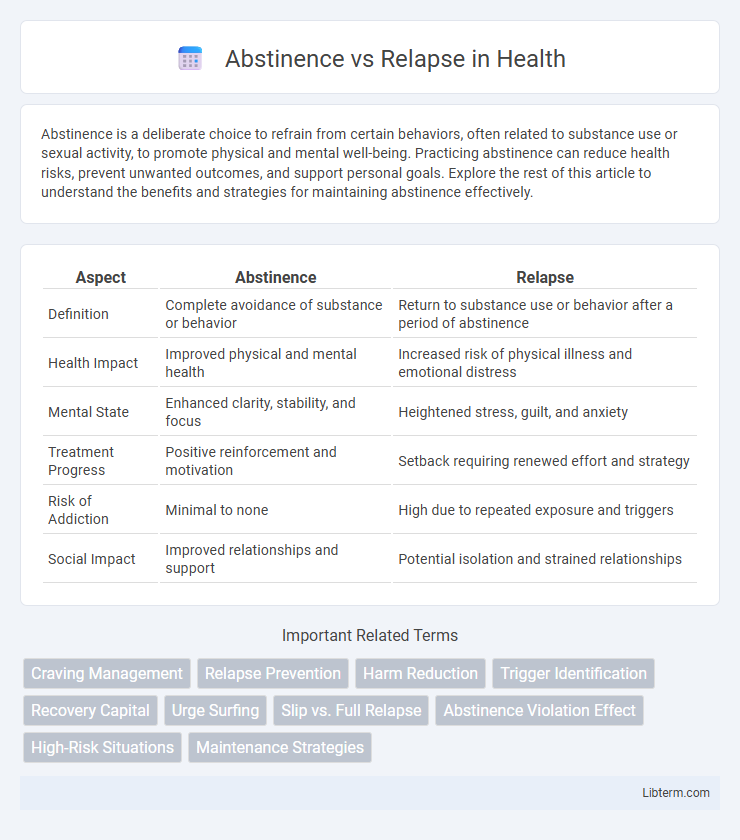Abstinence is a deliberate choice to refrain from certain behaviors, often related to substance use or sexual activity, to promote physical and mental well-being. Practicing abstinence can reduce health risks, prevent unwanted outcomes, and support personal goals. Explore the rest of this article to understand the benefits and strategies for maintaining abstinence effectively.
Table of Comparison
| Aspect | Abstinence | Relapse |
|---|---|---|
| Definition | Complete avoidance of substance or behavior | Return to substance use or behavior after a period of abstinence |
| Health Impact | Improved physical and mental health | Increased risk of physical illness and emotional distress |
| Mental State | Enhanced clarity, stability, and focus | Heightened stress, guilt, and anxiety |
| Treatment Progress | Positive reinforcement and motivation | Setback requiring renewed effort and strategy |
| Risk of Addiction | Minimal to none | High due to repeated exposure and triggers |
| Social Impact | Improved relationships and support | Potential isolation and strained relationships |
Understanding Abstinence: Definition and Benefits
Abstinence, defined as the voluntary refraining from addictive substances or behaviors, plays a critical role in recovery by promoting physical health and emotional stability. Benefits include reduced risk of relapse, improved cognitive function, and enhanced quality of life through restoring balance in brain chemistry. Understanding abstinence involves recognizing its impact on long-term sobriety and the importance of support systems to maintain sustainable behavioral change.
The Nature of Relapse: What It Means
Relapse involves a return to substance use after a period of abstinence, often triggered by stress, environmental cues, or psychological factors. It signifies a disruption in the recovery process rather than outright failure, highlighting the chronic nature of addiction. Understanding relapse as a common part of recovery allows for more effective treatment strategies that emphasize resilience and ongoing support.
Key Differences Between Abstinence and Relapse
Abstinence involves the conscious decision to completely avoid substance use or addictive behaviors, maintaining consistent sobriety and promoting physical and mental recovery. Relapse occurs when an individual returns to substance use after a period of abstinence, often triggered by stress, cravings, or environmental cues, and can lead to setbacks in treatment progress. Key differences include the commitment to sustained behavioral change in abstinence versus the recurrence of addictive patterns seen in relapse, impacting long-term recovery outcomes.
Psychological Factors Influencing Each Path
Psychological factors such as self-efficacy, coping mechanisms, and motivation levels play crucial roles in determining the likelihood of abstinence or relapse in addiction recovery. High stress, negative emotional states, and lack of social support significantly increase the risk of relapse, whereas strong cognitive-behavioral strategies and resilience promote sustained abstinence. Neurobiological changes in brain reward pathways also influence craving intensity and behavioral responses, impacting long-term recovery outcomes.
Common Triggers for Relapse
Common triggers for relapse include stress, exposure to drug-related environments, and emotional distress. Social pressure from friends or situations associated with prior substance use can significantly increase the risk of relapse. Identifying and managing these triggers through coping strategies and support systems is crucial for maintaining abstinence.
Strategies for Maintaining Abstinence
Effective strategies for maintaining abstinence include developing strong coping mechanisms such as mindfulness, cognitive-behavioral techniques, and building a reliable support network involving family, friends, and professional counselors. Establishing structured daily routines and avoiding triggers associated with relapse can significantly reduce the risk of returning to addictive behaviors. Continuous self-monitoring and participation in support groups like Alcoholics Anonymous provide accountability and reinforce long-term commitment to sobriety.
The Role of Support Systems in Recovery
Support systems play a crucial role in sustaining abstinence and preventing relapse by providing emotional encouragement, accountability, and practical assistance during recovery. Peer groups, family involvement, and professional counseling create a supportive environment that reduces isolation and strengthens coping mechanisms. Access to ongoing support networks significantly enhances long-term recovery outcomes by promoting resilience and encouraging consistent adherence to treatment plans.
Relapse as a Step in the Recovery Process
Relapse is often a common step in the recovery process, serving as a critical learning experience rather than a failure. Recognizing relapse as a signal to reassess triggers and coping strategies helps individuals strengthen their commitment to long-term sobriety. Effective relapse prevention plans incorporate continuous support, behavioral therapy, and self-awareness techniques to enhance resilience and recovery success.
Myths and Misconceptions About Relapse
Relapse is often misunderstood as a complete failure rather than a common part of the recovery process, leading to harmful stigma and discouragement. Many believe that a single relapse means permanent defeat, but research shows that it provides critical learning opportunities to strengthen long-term abstinence strategies. Understanding relapse as a temporary setback rather than a sign of weakness helps promote compassionate support and effective relapse prevention planning.
Building a Sustainable Long-Term Recovery Plan
Building a sustainable long-term recovery plan requires prioritizing abstinence to maintain clarity and reduce triggers associated with relapse. Incorporating strategies such as cognitive-behavioral therapy, mindfulness practices, and support networks strengthens resilience against cravings and environmental stressors. Consistent monitoring and adjustment of personalized recovery goals ensure enduring success and prevent setbacks in addiction treatment.
Abstinence Infographic

 libterm.com
libterm.com